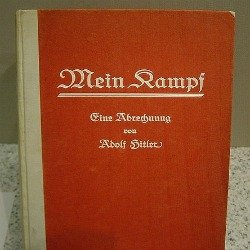BOB GARFIELD: Mein Kamp is one of the most notorious books of the 20th century, but few people have actually read it, and almost no Germans have. Why? Because the owners of the copyright since 1946 have refused to publish the book in Germany. But as the copyright’s 2015 expiration date approaches, Germans are struggling to figure out how to responsibly publish such a work. It’s a decision ultimately left to a single German state, the copyright owner, Bavaria. Nikolaus Peifer is a professor of the University of Cologne’s Institute for Media and Communication Law. He says that Bavaria has been the custodian of all of Hitler’s property since the end of World War II.
NIKOLAUS PEIFER: Germany enacted a law that said the state could take away the estate and property of the National Socialist Party and of its leaders. As Hitler had his domicile in Munich, the state of Bavaria was to take the estate that was in Bavaria, including the copyright. It was an excellent means to suppress the publication of Mein Kampf after the war because you wouldn’t have to argue about whether there’s a constitutional conflict with giving a ban on publication of this book.
BOB GARFIELD: In 1945 - I’m sure 70 years seems like a long time, but lo and behold it’s just around the corner, and Mein Kampf will revert to the public domain. Is there any pent-up demand for Mein Kampf?
NIKOLAUS PEIFER: Well, after nearly 70 years there is a certain demand of getting to know what’s the fuss about the book. So in 2016, on January 1st, when the copyright is released, many commercial versions, also cheap versions, will be on the market, and the state of Bavaria now has to think fast about how to get a certain kind of control over the market of opinions. So it’s high time to think about a solution to that problem.
BOB GARFIELD: In fact, somebody has thought of a solution. There is in the works an annotated version of Mein Kampf, subsidized by the government. What will it look like?
NIKOLAUS PEIFER: There is no clear knowledge about what the original text is that was written or dictated by Hitler himself. So this group of historians will try to find out what the real version is. They will also try to give explanations concerning the sources Hitler used when he wrote this book, and the group will give information of what Hitler had rightly understood by his sources and what he got completely wrong.
BOB GARFIELD: There’s been some criticism of the notion of annotating this 800-page screed, because an annotation presumes some sort of literary merit to begin with. Now, I haven’t read Mein Kampf but I gather it’s quite unhinged.
NIKOLAUS PEIFER: Those persons who have read it say it’s completely unreadable. However, Churchill said if people had read it before the war, we would have known more exactly what this person was planning. There is one sentence saying that if ten or fifteen thousand Jews had been gassed, then millions of German soldiers in the First World War would have survived. At least, one could argue what this person was like, what was going on in his mind.
BOB GARFIELD: I want to talk about the 1st Amendment that you don’t have. Here, this would be a non-issue because almost all speech is tolerated, even hate speech. Germany after the war has taken two apparently opposing paths. It has done a tremendous amount of introspection and study on the Nazi period, while banning anything that can be regarded as hate speech or Holocaust denial. Has the government achieved what it wanted to do by suppressing speech?
NIKOLAUS PEIFER: That’s a hard question. You were mentioning we don’t have a 1st Amendment; we don’t have it as you have it in the form of freedom of expression. But we have a similar provision in our constitution, and this Article V differs between opinions and facts. And when it comes to facts, it differs again between true facts, false facts and knowingly false facts.
And this last group are not protected by the constitution, so the expression that there has never been anything like concentration camps, it’s a proven historical fact that this is wrong. You know that it’s wrong. And if you want to say it, you're not protected by the constitution. And that might help in a democratic society in Germany after the war that was maybe weaker than the democratic society in England, and maybe also in the United States.
BOB GARFIELD: I mentioned pent-up demand. When, when this book is published, what’s gonna happen? Is it gonna fly off the shelves, or do you think German society as a whole will go “Eh, never mind?”
NIKOLAUS PEIFER: It’s not going to fly off the shelves. Many people will buy it, I’m sure about that. And that is an experience in those countries in which the book was published, even in, in recent years, but people will soon detect that it’s not interesting stuff; it’s not fun to read. So in certain circles, it will circulate as a symbol. In historic, academic and school circles, it will be read, it will be discussed, but it won’t be a bestseller.
BOB GARFIELD: Nicholas, thank you so much.
NIKOLAUS PEIFER: Welcome.
BOB GARFIELD: Nikolaus Peifer is a professor at the University of Cologne’s Institute for Media and Communication Law.

